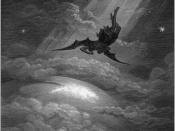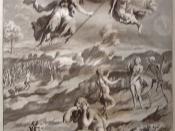The Birth of ArtificeAny author that attempts to depict the origins of mankind must first deal with the greatest challenge of all: the limitations of a modern mentality whose perspective on life creates narrow paths through which the author must navigate carefully. When trying to describe the indescribable, to understand the unknown, or to transcend the finite to the infinite Milton understands the limitations of language; "Paradise Lost" - the greatest epic of all - is a conversation between the author and the reader, between the past and the present that is easily understood; however, Milton is quick to remind both himself and the reader that language is inherently fallen. Milton's purpose is to write "Of things invisible to mortal sight" (iii. 55); that is to say, he reveals - over the course of twelve books - both that mankind has fallen from immortality to mortality and that its fallen nature prevents its physical and intellectual "sight" from comprehending the spiritual realm.
By contrasting an original perfect state to that of the fallen state of mankind, Milton puts the spotlight on the moment in time when "artifice" enters and alters human life forever. Artifice, first presented to Eve through the appearance and speech of Satan, is later materialized through the clothes that Adam and Eve begin to wear. A broken relationship with God creates a separation within the first humans between their - now empty - interiors and their exteriors which must be covered. There ceases to be intimacy - into-me-see - both between people and God, and between Adam and Eve as a couple. Milton argues that it is now impossible to let the façade go; the mask, the clothes, remain as an intrinsic part of fallen life and the only person that can see humanity naked is God.



Good Work
The essay flows well and your arguments have been very well backed up. Your biblio has been set out nicely. Good Work
0 out of 0 people found this comment useful.